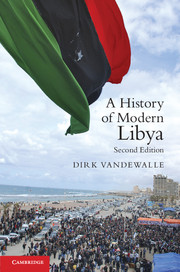Book contents
- Frontmatter
- Contents
- Illustrations
- Maps
- Preface to the Second Edition
- Preface to the First Edition
- Chronology, 1900–2011
- Acronyms
- Introduction: Libya, the enigmatic oil state
- Chapter 1 “A tract which is wholly sand …” Herodotus
- Chapter 2 Italy’s Fourth Shore and decolonization, 1911–1950
- Chapter 3 The Sanusi Monarchy as Accidental State, 1951–1969
- Chapter 4 A Libyan sandstorm: from monarchy to republic, 1969–1973
- Chapter 5 The Green Book’s stateless society, 1973–1986
- Chapter 6 The limits of the revolution, 1986–2000
- Chapter 7 Reconciliation, civil war, and fin de régime, 2003–2011
- Epilogue Whither Libya?
- Notes
- Bibliography
- Index
Chapter 7 - Reconciliation, civil war, and fin de régime, 2003–2011
Published online by Cambridge University Press: 05 June 2012
- Frontmatter
- Contents
- Illustrations
- Maps
- Preface to the Second Edition
- Preface to the First Edition
- Chronology, 1900–2011
- Acronyms
- Introduction: Libya, the enigmatic oil state
- Chapter 1 “A tract which is wholly sand …” Herodotus
- Chapter 2 Italy’s Fourth Shore and decolonization, 1911–1950
- Chapter 3 The Sanusi Monarchy as Accidental State, 1951–1969
- Chapter 4 A Libyan sandstorm: from monarchy to republic, 1969–1973
- Chapter 5 The Green Book’s stateless society, 1973–1986
- Chapter 6 The limits of the revolution, 1986–2000
- Chapter 7 Reconciliation, civil war, and fin de régime, 2003–2011
- Epilogue Whither Libya?
- Notes
- Bibliography
- Index
Summary
The period between 2003 and 2011 in Qadhafi’s Libya was marked both by continuity in how the regime retained its hold on power and by a set of discontinuities as the country started to adjust to its reintegration into the international community from which it had been excluded for two decades. When the regime decided to give up its weapons of mass destruction (WMD) in December 2003, Qadhafi’s self-proclaimed revolution had left indelible patterns on the country’s political, social, and economic structures. To many observers, but particularly to Saif al-Islam al-Qadhafi, the Libya’s leader’s son, it was clear that many of those structures now needed to change if the country were to fully benefit from the opportunities its reintegration into the international economy and community afforded. Western-educated, Saif al-Islam al-Qadhafi argued that to meet the challenges of Libya’s emergence from its diplomatic and economic isolation, both political and economic reforms would be needed. The resistance to the ideas and initiatives of Saif al-Islam as self-appointed reformer ensured that his efforts would run into severe difficulties, hinting at the debilitating legacies Libya faced after more than three decades of his father’s experiments in statelessness.
By the time the agreement on WMD was signed in December 2003, European and other foreign investors had started to make their way back to Tripoli after the multilateral sanctions were suspended in April 1999. It was clear, however, that only a complete lifting of the U.S. sanctions could deliver the kind of economic resurgence and the necessary international diplomatic imprimatur that both Said al-Islam al-Qadhafi and his father sought. This could only be accomplished if the Jamahiriyya was taken off the U.S. State Department’s list of sponsors of state terrorism. The country’s economy, beyond the oil sector, remained unproductive and actively involved few of the country’s citizens. The infrastructure of the oil sector itself was aging, and Libya needed substantial investment to update it – conservatively estimated between $10 billion and $30 billion in the medium to long term to increase its oil production to 3 million barrels per day within a decade. Although the Libyan National Oil Company (LNOC) had established itself as a capable manager of the country’s oil fields, its officials were the first to admit that the country required international technology and know-how that would enable it to expand production, in part by drilling for oil beyond the Sirt Basin, including offshore. Libya needed the kind of expertise and capital investment that could only be provided by some of the Western – including U.S. – companies that had left the country as a result of the sanctions or because of the uncertainty of the investment climate in Libya.
- Type
- Chapter
- Information
- A History of Modern Libya , pp. 173 - 209Publisher: Cambridge University PressPrint publication year: 2012



